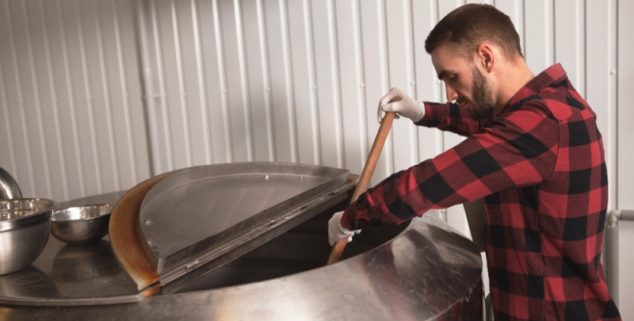News
Beer battle brewing over distribution
 A worker at a small brewery examines beer during the fermentation process. (Photo: MAD_Production, via Shutterstock)
A worker at a small brewery examines beer during the fermentation process. (Photo: MAD_Production, via Shutterstock)An under-the-radar tussle is shaping up in California over how beer is being brought to drinkers across the state.
The emerging beer battle pits small craft brewers against big distributors.
On one side are the small, family-owned brewers, who charge that the big distributors don’t want to bother with the relatively small volumes of craft brewers and would be delighted if the beer world was limited to the major brands distributed exclusively by them, never mind small brewers distribution. The small brewers say they have resource and logistical problems in attempting to distribute their product as widely as large distributors can.
The legal framework of beer distribution’s roots go back to a system created after prohibition ended: In most states, including California, brewers make beer, distributors buy it, warehouse it and in turn sell it to retailers (markets, bars, restaurants) who then sell it to consumers.
Small breweries can sell their product directly in California via “brew pubs,” owned and operated on-site, but that is not the same as wide distribution to supermarkets and liquor stores.
Through 2019, there were 1,039 craft brewers in California, more than any other state. Individually, some may be modest in output, but collectively they have clout. According to pre-pandemic numbers, the craft brewers generated more than 61,300 jobs across California and contributed more than $9 billion to the state’s economy.
Better than nine out of 10 Californians live within 10 miles of a brewery; craft brewers alone produced 3.4 million barrels of beer in 2018, according to the California Craft Brewers Association.
But the issue for the family-owned distributors is dominance of the big players.
“Large, out-of-state distributor corporations are forcing local, family-owned distributors out of business using unfair business practices, says Leesa Danzek, a spokeswoman for the newly formed California Family Beer Distributors. “Specifically, some of these companies are unfairly terminating contracts and forcing the sale of certain brands, threatening independent distributors and customers who rely on their experience for choice of product.”
“They regard (small brewers) as a pain in the ass,” said longtime Sacramento distributor Hayden Markstein, referring to the large out-of-state distributors. Markstein is the CEO of Markstein Beveridge Company of Sacramento.
In their defense, smaller family-owned distributors in 2020 pooled their resources and last year formed the California Family Beer Distributors, which bills itself as an organization of independent, family-owned, small companies that care about their communities and are merely seeking fairness.
“Many of our members have been operating in their local markets for 50, 75 or even 100 years,” the group’s web site notes.
Reyes Beer Distributors, headquartered in Chicago and billing itself as the nation’s largest beer distributor, did not respond to repeated telephone calls and emails from Capitol Weekly. Others also did not respond.
Despite its plethora of breweries, California is not a champion beer consumer, ranking 44th among the states with the average adult in the state consuming 25.5 gallons per year. The national average is 28.2 gallons per year, roughly equivalent to one six pack per week. ( North Dakota is the nation’s top beer guzzler, with the average adult downing 45.8 gallons annually.)
What does the future hold?
It remains to be seen whether the California Family Beer Distributors will flourish against the big distributors, but Markstein says the new organization is “up and running.”
—
Editor’s Note: Clarifies 10th paragraph quote to show reference to distributors, edits to conform.
Want to see more stories like this? Sign up for The Roundup, the free daily newsletter about California politics from the editors of Capitol Weekly. Stay up to date on the news you need to know.
Sign up below, then look for a confirmation email in your inbox.

Leave a Reply